Yvy Marane’y “Land Without Evil” Institute
Supporting Guaraní and Kaiowá Resilience in a Context of Territorial Struggle
about the guaraní-kaiowá
About the Guaraní-Kaiowá
The Guaraní and Kaiowá (Pai-Tavyterã) are Brazil’s second-largest Indigenous group, with 50,000 people primarily in Mato Grosso do Sul. Their culture, dating to the 5th century CE, centers on tekoha—the place where they can fully realize their way of being through social, economic, and spiritual practices. Traditionally semi-nomadic with sustainable agricultural practices, they maintain strong community structures guided by spiritual leaders and preserve their Guaraní language. Since the 19th century, colonization and land exploitation for yerba mate and agriculture have displaced them from ancestral territories. Currently, many live in overcrowded reservations while others engage in retomadas—reoccupations of traditional lands. They face restricted land access, inadequate healthcare and education, food insecurity, environmental degradation, and violence from agribusiness operations. Land conflicts continue with reports of attacks and intimidation. Despite these systemic challenges, the Guaraní and Kaiowá actively fight for their territorial rights, maintain their cultural practices, and work toward securing their future through their deep connection to the land and strong community resilience.
About ITM
About Yvy Marane’y “Land Without Evil” Institute
Founded in 2020, the Yvy Marane’y “Land Without Evil” Institute is an emerging Indigenous-led organization working to improve living conditions, human dignity, and autonomy for Guaraní and Kaiowá communities in southern Mato Grosso do Sul, Brazil. The Institute comprises approximately 45 families, primarily from the Amambai village (population over 10,000), with additional members from Taquaperi village and the Kurusu Ambá territorial reclamation area.
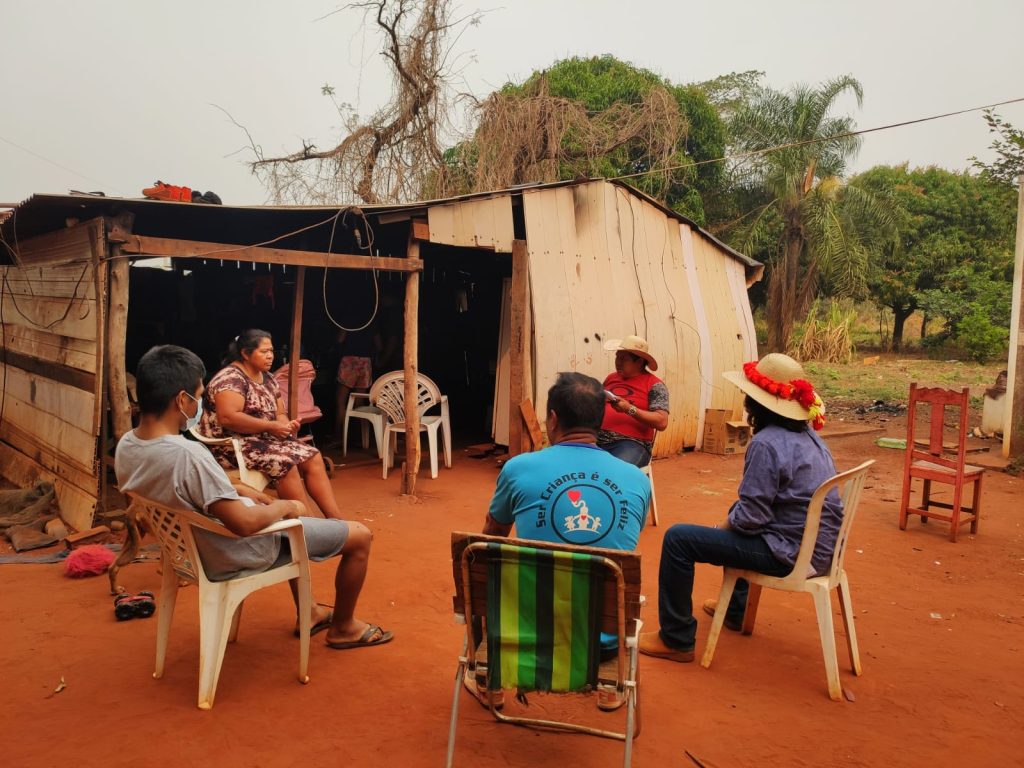
Under the leadership of Elizeu Pereira Lopes, his wife Janete Ferreira Alegre, and other community members, the Institute works to respond to immediate community needs while building toward longer-term goals in traditional agriculture, medicinal plants, and cultural preservation. Elizeu serves as a frontline leader in territorial defense, often responding to emergencies in dangerous border regions where Indigenous communities face threats from surrounding agricultural interests.
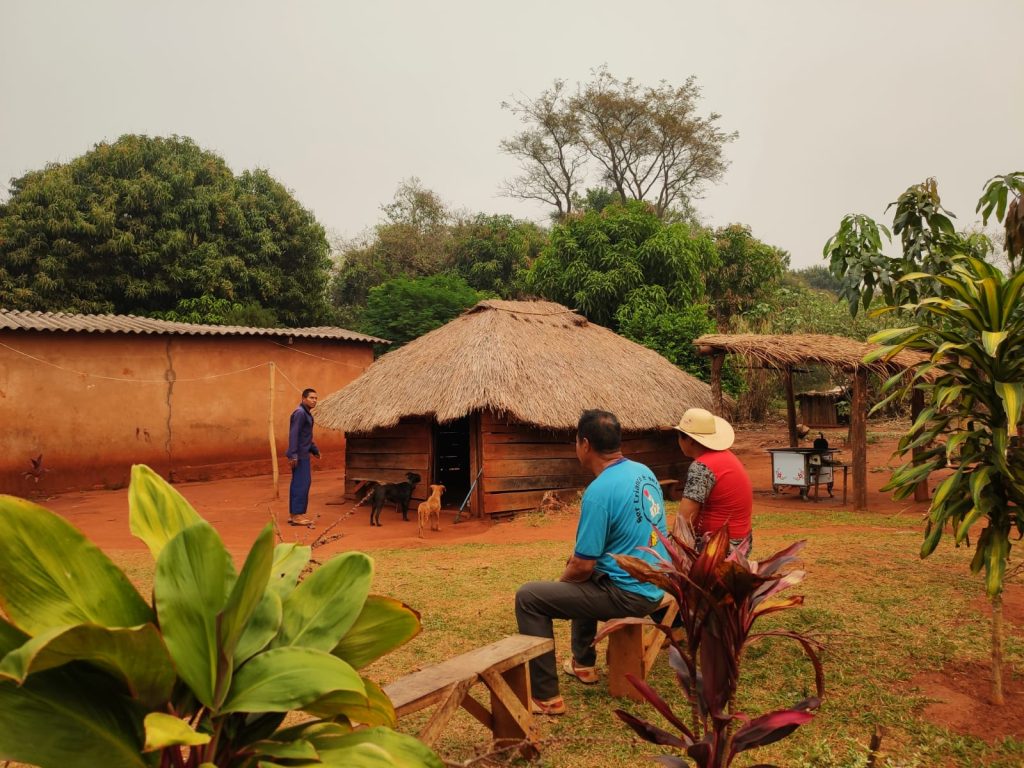
The Guaraní and Kaiowá, who self-identify as Pai-Tavyterã, are the second-largest Indigenous group in Brazil, with approximately 50,000 people. Their cosmovision is deeply rooted in their relationship with the land through the concept of tekoha — not just a physical space but the place where they can fully realize their way of being. These communities face extreme challenges including violent land conflicts, forced displacement, limited access to clean water, inadequate healthcare, and minimal state support in a region that Yvoty Medina, the Institute’s project manager, describes as “anti-Indigenous.”
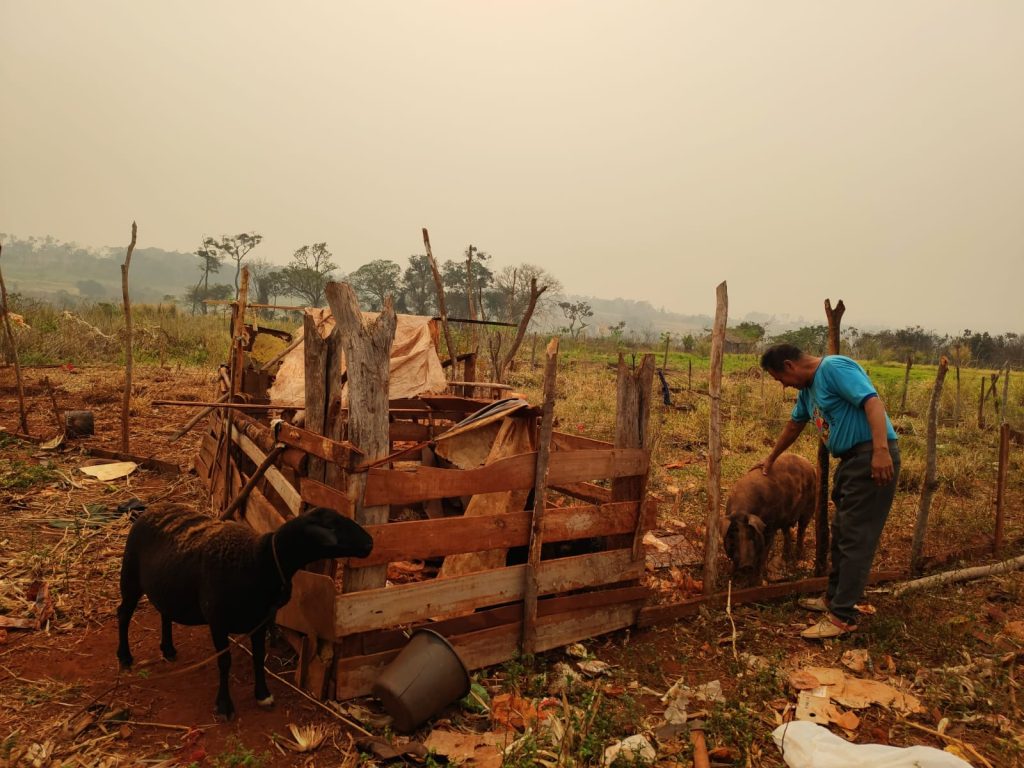
Understanding Retomadas: Reclaiming Sacred Territory
The Institute’s work takes place in both officially recognized Indigenous territories and in “retomadas” — areas that Guaraní and Kaiowá communities have reclaimed as part of their ancestral lands. As Yvoty explains, understanding retomadas requires stepping back in history: “Modern nations carved up Guaraní and Kaiowá territory — the great Guaraní nation was divided into four modern nations: Paraguay, Argentina, Brazil, and Bolivia, creating borders where none existed.”
Following this territorial division, private landowners irregularly acquired these lands and systematically expelled Indigenous peoples, using them as forced labor, killing, burning houses, and destroying communities. Starting in the 1970s, the great Aty Guasu council — the traditional Guaraní Kaiowá council — decided to retake these usurped territories using “only” the strength of the body, mind, and prayer.
These retomadas represent encampments where families arrive with tarps and basic supplies to reclaim devastated land stripped of vegetation by industrial agriculture. As Yvoty describes:
When you retake these areas, they aren’t legally recognized as belonging to Guaraní Kaiowá people. So there are conflicts over land repossession, police, military, even helicopters flying over to intimidate the population.
The process involves not just physical reclamation but spiritual restoration:
When you retake the land, it’s all devastated, so you have to re-sacralize it, re-territorialize it — bring back all the enchanted, spiritual and cosmological entities to live there that had left.
The first priority is establishing a prayer house where the community can gather.
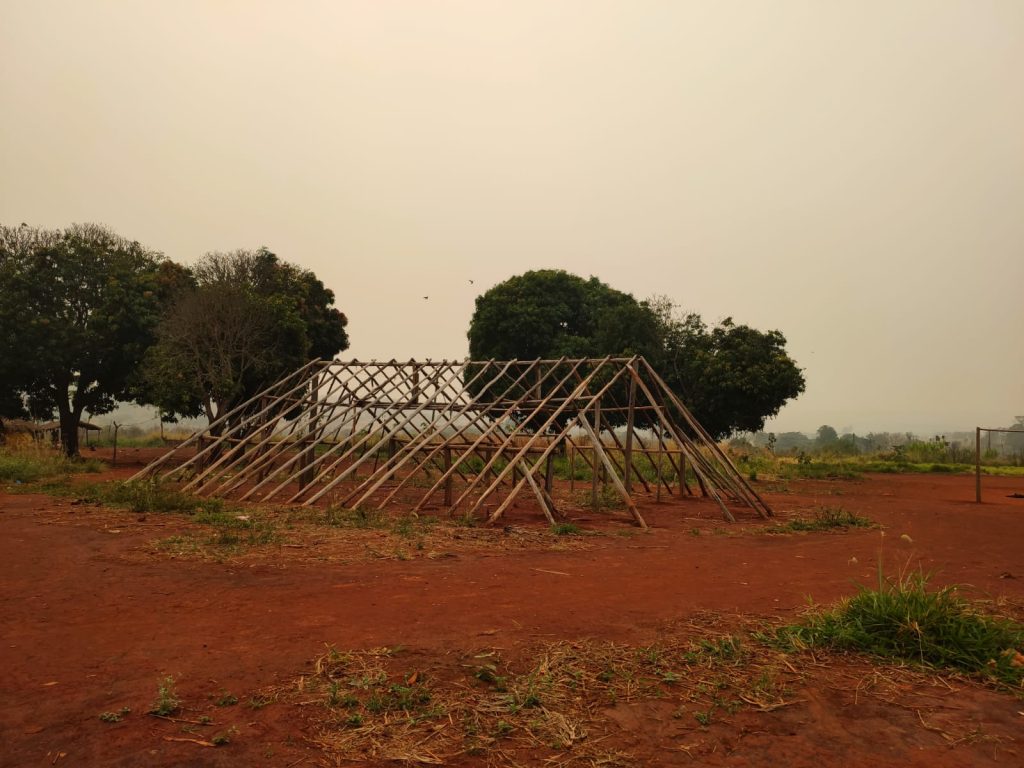
“Retomadas represent the retaking of life, of sacred living space, of being able to exist with your family and children,” Yvoty explains.
This context illuminates why Elizeu’s work as a frontline leader involves such extreme risks and why the Institute’s support for mobility and emergency response is crucial. The Institute is developing partnerships with organizations like FIAN Brazil and Meli Bees Network, while also participating in capacity-building programs to strengthen their organizational structure and project management capabilities.
Our partnership
Our partnership
A Collaborative Journey in Community Resilience
Our partnership with Yvy Marane’y Institute began in 2023 when we connected with their leadership about potential support for Guaraní and Kaiowá families facing critical challenges. This developing relationship reflects our commitment to Indigenous self-determination while acknowledging the complex realities of grassroots organizing in contested territories.
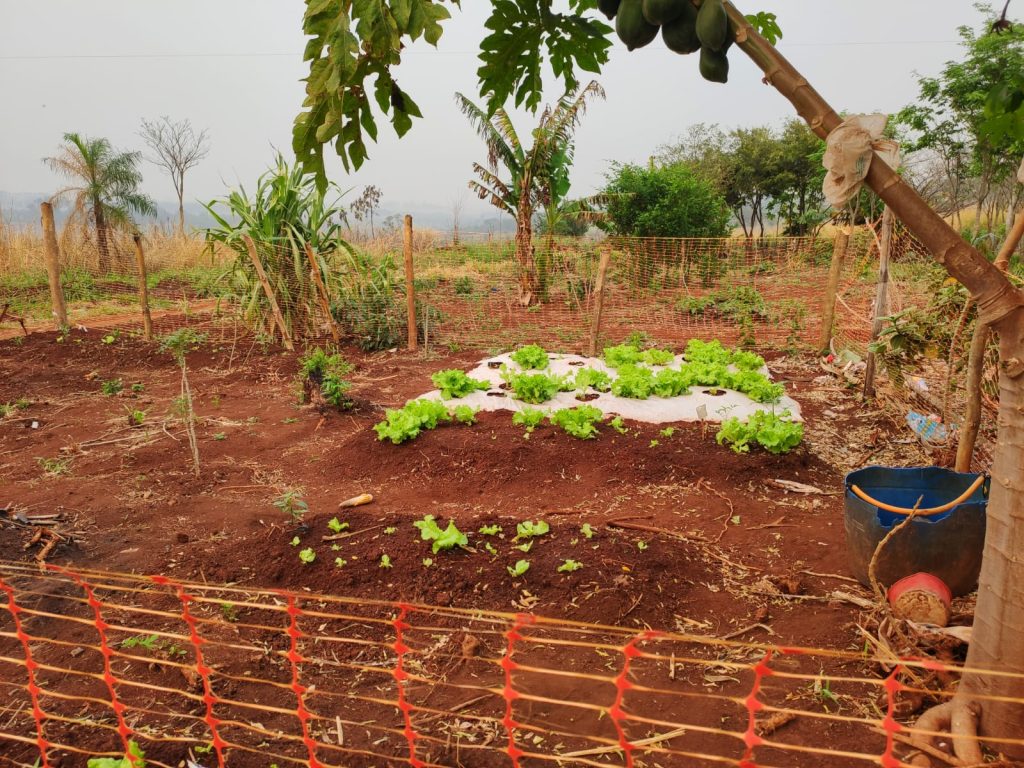
The initial project focused on water access for families in three communities. As implementation progressed, the Institute adapted its approach to address immediate community needs, including mobility challenges that limited their ability to respond to emergencies and coordinate community activities. According to Janete, the Institute’s treasurer
We were practically without energy, with our association founded and organized but not knowing where to start or what to do… in this difficult moment when we needed it, the foundation came and supported us.
This flexibility has enabled core team members to dedicate themselves to the Institute’s development rather than seeking outside employment, which previously limited their ability to coordinate efforts. Elizeu, who frequently travels between communities to mediate conflicts and respond to emergencies, notes that the support has “helped us to have this beginning of work,” particularly in strengthening traditional agriculture and medicinal plant knowledge.
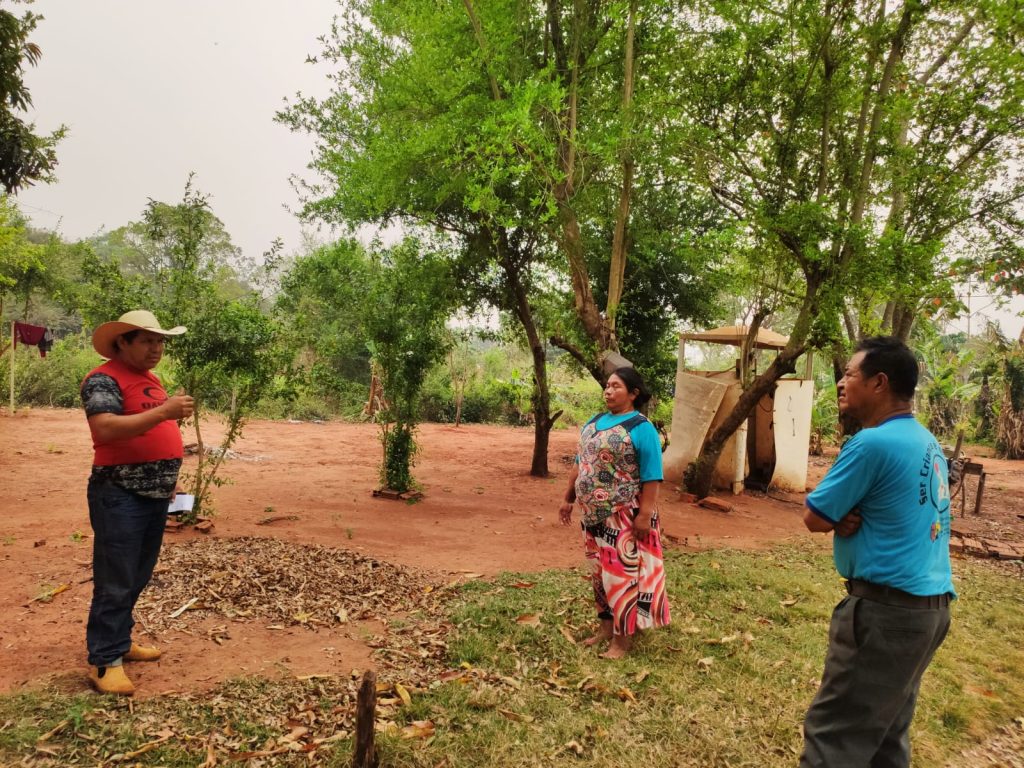
Building Organizational Capacity for Community-Led Change
Our collaboration emphasizes building the Institute’s organizational capacity alongside their community initiatives. Yvoty Medina explains that the partnership has helped them move from “high goals” to more practical implementation strategies:
We had registered [the association] but didn’t yet know how it worked… with this support, we managed to dedicate a year exclusively to the association.
Through this process, the Institute is defining core concepts and indicators focused on “ethno-forestry” and “ethno-gardens” to guide their work in traditional agriculture and medicinal plants. They’re also participating in capacity-building opportunities, including with Brazil’s Ecos Fund, to develop sustainable planning and management practices.
As with many emerging Indigenous-led organizations, this partnership involves ongoing dialogue about priorities, documentation, and mutual accountability. We maintain open communication about challenges while respecting the Institute’s insight into their community’s most pressing needs.
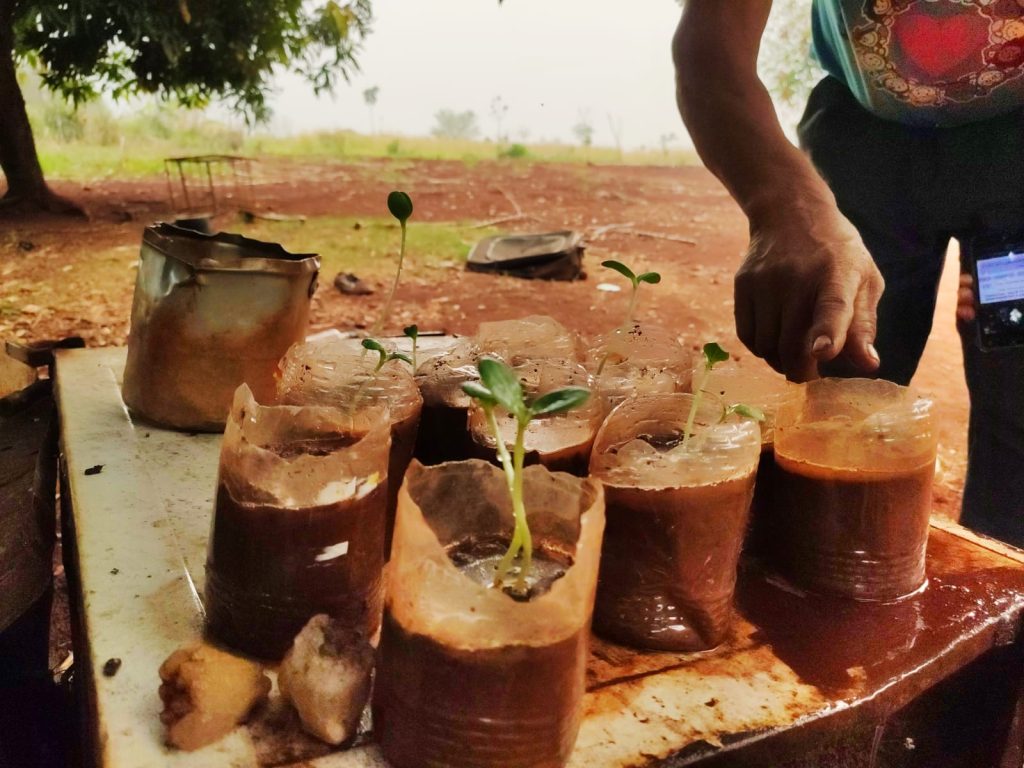
IMPACT
Impact
The Yvy Marane’y Institute’s work is creating important foundations for community resilience in a context of extreme challenges:
Supporting 45 families through initiatives in traditional agriculture, medicinal plants, and cultural preservation
Enhancing emergency response capacity by enabling leadership to travel between communities in crisis situations, especially in territorial defense contexts
Strengthening traditional knowledge by supporting elders like Elizeu’s father, a centenarian spiritual leader who maintains a traditional prayer house and serves as a “library” of cultural knowledge
Creating space for women’s leadership through initiatives focused on medicinal plants, traditional handicrafts, and building economic autonomy
Developing organizational infrastructure by allowing key team members to focus on building the Institute rather than seeking outside employment
Building capacity through training as team members develop skills in project management, organizational governance, and strategic planning
Revitalizing cultural practices through support for prayer houses and traditional ceremonies that had been threatened by external forces
The Institute has also created hope within communities facing extreme marginalization. As Elizeu notes, “We want to say to the organization to continue looking out for us, as we are a people who are abandoned, to tell the truth, by the State, our own State, which is Brazil, our State of Mato Grosso do Sul, which is anti-Indigenous.”
These efforts are particularly significant given the Institute’s stage of development and the complex challenges they face, including violent territorial conflicts, lack of basic infrastructure, and minimal state support. While much work remains, the foundation being built now provides critical organizational capacity for future initiatives.
Updates
Updates
News from the ground on projects, initiatives and collaborations.
View this post on Instagram
View this post on Instagram
View this post on Instagram
View this post on Instagram
SUPPORT
Support
You can join us in supporting the Yvy Marane’y Institute’s developing work with Guaraní and Kaiowá communities by:
Following their Instagram account @yvy_maraney_itm to stay updated on their initiatives
Learning about the complex realities facing Guaraní and Kaiowá communities, particularly their territorial struggles and resilience
Sharing their story to raise awareness about both the challenges and the community-led solutions being developed
Supporting emerging Indigenous-led organizations with patience, flexibility, and respect for their frontline understanding of community priorities
By supporting organizations like the Yvy Marane’y Institute, you contribute to Indigenous-led efforts to protect cultural heritage and territorial rights in contexts of extreme pressure. As Janete observes,
What was a problem in the past, today is the solution for the future.
Despite significant challenges, the Institute demonstrates the power of community organizing in even the most difficult circumstances. As Yvoty shares, “With this time that we had… we managed to integrate this team… and now we’ve managed to define two concepts and indicators: ethno-forestry and ethno-gardens,” creating a foundation for sustainable initiatives rooted in Guaraní and Kaiowá knowledge and priorities.
— Connect with ITM —
Yvy Marane’y “Land Without Evil” Institute
Supporting Guaraní and Kaiowá Resilience in a Context of Territorial Struggle
about the guaraní-kaiowá
About the Guaraní-Kaiowá
The Guaraní and Kaiowá (Pai-Tavyterã) are Brazil’s second-largest Indigenous group, with 50,000 people primarily in Mato Grosso do Sul. Their culture, dating to the 5th century CE, centers on tekoha—the place where they can fully realize their way of being through social, economic, and spiritual practices. Traditionally semi-nomadic with sustainable agricultural practices, they maintain strong community structures guided by spiritual leaders and preserve their Guaraní language. Since the 19th century, colonization and land exploitation for yerba mate and agriculture have displaced them from ancestral territories. Currently, many live in overcrowded reservations while others engage in retomadas—reoccupations of traditional lands. They face restricted land access, inadequate healthcare and education, food insecurity, environmental degradation, and violence from agribusiness operations. Land conflicts continue with reports of attacks and intimidation. Despite these systemic challenges, the Guaraní and Kaiowá actively fight for their territorial rights, maintain their cultural practices, and work toward securing their future through their deep connection to the land and strong community resilience.
About ITM
About Yvy Marane’y “Land Without Evil” Institute
Founded in 2020, the Yvy Marane’y “Land Without Evil” Institute is an emerging Indigenous-led organization working to improve living conditions, human dignity, and autonomy for Guaraní and Kaiowá communities in southern Mato Grosso do Sul, Brazil. The Institute comprises approximately 45 families, primarily from the Amambai village (population over 10,000), with additional members from Taquaperi village and the Kurusu Ambá territorial reclamation area.

Under the leadership of Elizeu Pereira Lopes, his wife Janete Ferreira Alegre, and other community members, the Institute works to respond to immediate community needs while building toward longer-term goals in traditional agriculture, medicinal plants, and cultural preservation. Elizeu serves as a frontline leader in territorial defense, often responding to emergencies in dangerous border regions where Indigenous communities face threats from surrounding agricultural interests.

The Guaraní and Kaiowá, who self-identify as Pai-Tavyterã, are the second-largest Indigenous group in Brazil, with approximately 50,000 people. Their cosmovision is deeply rooted in their relationship with the land through the concept of tekoha — not just a physical space but the place where they can fully realize their way of being. These communities face extreme challenges including violent land conflicts, forced displacement, limited access to clean water, inadequate healthcare, and minimal state support in a region that Yvoty Medina, the Institute’s project manager, describes as “anti-Indigenous.”

Understanding Retomadas: Reclaiming Sacred Territory
The Institute’s work takes place in both officially recognized Indigenous territories and in “retomadas” — areas that Guaraní and Kaiowá communities have reclaimed as part of their ancestral lands. As Yvoty explains, understanding retomadas requires stepping back in history: “Modern nations carved up Guaraní and Kaiowá territory — the great Guaraní nation was divided into four modern nations: Paraguay, Argentina, Brazil, and Bolivia, creating borders where none existed.”
Following this territorial division, private landowners irregularly acquired these lands and systematically expelled Indigenous peoples, using them as forced labor, killing, burning houses, and destroying communities. Starting in the 1970s, the great Aty Guasu council — the traditional Guaraní Kaiowá council — decided to retake these usurped territories using “only” the strength of the body, mind, and prayer.
These retomadas represent encampments where families arrive with tarps and basic supplies to reclaim devastated land stripped of vegetation by industrial agriculture. As Yvoty describes:
When you retake these areas, they aren’t legally recognized as belonging to Guaraní Kaiowá people. So there are conflicts over land repossession, police, military, even helicopters flying over to intimidate the population.
The process involves not just physical reclamation but spiritual restoration:
When you retake the land, it’s all devastated, so you have to re-sacralize it, re-territorialize it — bring back all the enchanted, spiritual and cosmological entities to live there that had left.
The first priority is establishing a prayer house where the community can gather.

“Retomadas represent the retaking of life, of sacred living space, of being able to exist with your family and children,” Yvoty explains.
This context illuminates why Elizeu’s work as a frontline leader involves such extreme risks and why the Institute’s support for mobility and emergency response is crucial. The Institute is developing partnerships with organizations like FIAN Brazil and Meli Bees Network, while also participating in capacity-building programs to strengthen their organizational structure and project management capabilities.
Our partnership
Our partnership
A Collaborative Journey in Community Resilience
Our partnership with Yvy Marane’y Institute began in 2023 when we connected with their leadership about potential support for Guaraní and Kaiowá families facing critical challenges. This developing relationship reflects our commitment to Indigenous self-determination while acknowledging the complex realities of grassroots organizing in contested territories.

The initial project focused on water access for families in three communities. As implementation progressed, the Institute adapted its approach to address immediate community needs, including mobility challenges that limited their ability to respond to emergencies and coordinate community activities. According to Janete, the Institute’s treasurer
We were practically without energy, with our association founded and organized but not knowing where to start or what to do… in this difficult moment when we needed it, the foundation came and supported us.
This flexibility has enabled core team members to dedicate themselves to the Institute’s development rather than seeking outside employment, which previously limited their ability to coordinate efforts. Elizeu, who frequently travels between communities to mediate conflicts and respond to emergencies, notes that the support has “helped us to have this beginning of work,” particularly in strengthening traditional agriculture and medicinal plant knowledge.

Building Organizational Capacity for Community-Led Change
Our collaboration emphasizes building the Institute’s organizational capacity alongside their community initiatives. Yvoty Medina explains that the partnership has helped them move from “high goals” to more practical implementation strategies:
We had registered [the association] but didn’t yet know how it worked… with this support, we managed to dedicate a year exclusively to the association.
Through this process, the Institute is defining core concepts and indicators focused on “ethno-forestry” and “ethno-gardens” to guide their work in traditional agriculture and medicinal plants. They’re also participating in capacity-building opportunities, including with Brazil’s Ecos Fund, to develop sustainable planning and management practices.
As with many emerging Indigenous-led organizations, this partnership involves ongoing dialogue about priorities, documentation, and mutual accountability. We maintain open communication about challenges while respecting the Institute’s insight into their community’s most pressing needs.

IMPACT
Impact
The Yvy Marane’y Institute’s work is creating important foundations for community resilience in a context of extreme challenges:
Supporting 45 families through initiatives in traditional agriculture, medicinal plants, and cultural preservation
Enhancing emergency response capacity by enabling leadership to travel between communities in crisis situations, especially in territorial defense contexts
Strengthening traditional knowledge by supporting elders like Elizeu’s father, a centenarian spiritual leader who maintains a traditional prayer house and serves as a “library” of cultural knowledge
Creating space for women’s leadership through initiatives focused on medicinal plants, traditional handicrafts, and building economic autonomy
Developing organizational infrastructure by allowing key team members to focus on building the Institute rather than seeking outside employment
Building capacity through training as team members develop skills in project management, organizational governance, and strategic planning
Revitalizing cultural practices through support for prayer houses and traditional ceremonies that had been threatened by external forces
The Institute has also created hope within communities facing extreme marginalization. As Elizeu notes, “We want to say to the organization to continue looking out for us, as we are a people who are abandoned, to tell the truth, by the State, our own State, which is Brazil, our State of Mato Grosso do Sul, which is anti-Indigenous.”
These efforts are particularly significant given the Institute’s stage of development and the complex challenges they face, including violent territorial conflicts, lack of basic infrastructure, and minimal state support. While much work remains, the foundation being built now provides critical organizational capacity for future initiatives.
Updates
Updates
News from the ground on projects, initiatives and collaborations.
View this post on Instagram
View this post on Instagram
View this post on Instagram
View this post on Instagram
SUPPORT
Support
You can join us in supporting the Yvy Marane’y Institute’s developing work with Guaraní and Kaiowá communities by:
Following their Instagram account @yvy_maraney_itm to stay updated on their initiatives
Learning about the complex realities facing Guaraní and Kaiowá communities, particularly their territorial struggles and resilience
Sharing their story to raise awareness about both the challenges and the community-led solutions being developed
Supporting emerging Indigenous-led organizations with patience, flexibility, and respect for their frontline understanding of community priorities
By supporting organizations like the Yvy Marane’y Institute, you contribute to Indigenous-led efforts to protect cultural heritage and territorial rights in contexts of extreme pressure. As Janete observes,
What was a problem in the past, today is the solution for the future.
Despite significant challenges, the Institute demonstrates the power of community organizing in even the most difficult circumstances. As Yvoty shares, “With this time that we had… we managed to integrate this team… and now we’ve managed to define two concepts and indicators: ethno-forestry and ethno-gardens,” creating a foundation for sustainable initiatives rooted in Guaraní and Kaiowá knowledge and priorities.
— Connect with ITM —






